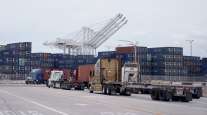Senior Reporter
Trump Calls Infrastructure Investment ‘A Necessity’
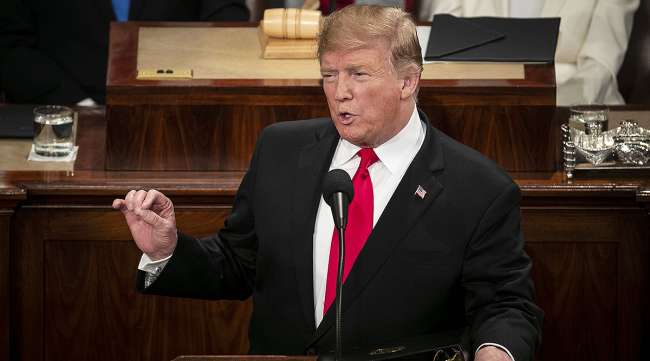
President Donald Trump called investment in infrastructure “a necessity,” but a detailed articulation of a vision for rebuilding the country’s crumbling roads and bridges was absent from a much-anticipated State of the Union address that focused primarily on security concerns and immigration policy.
During a lengthy speech Feb. 5 to a joint session of Congress on Capitol Hill, the president affirmed that Republicans, in control of the Senate, as well as Democrats who took over the House after the 2018 midterm elections, possess the political acuity to “unite for a great rebuilding of America’s crumbling infrastructure.”
“I know that the Congress is eager to pass an infrastructure bill, and I am eager to work with you on legislation to deliver new and important infrastructure investment, including investments in the cutting-edge industries of the future,” Trump said. “This is not an option. This is a necessity.”
The president, however, stopped short of signaling if or when his team would unveil a proposal that would address the repairs for such crumbling infrastructure, or the requisite cost for a nationwide rebuilding campaign.
A White House note that expanded on Trump’s address indicated the president “urges Congress to pass a bill that delivers new and important infrastructure investment to rebuild our crumbling roads, aging bridges, crowded airports, and other infrastructure.” The note emphasized support for streamlining the permitting process and highlighted the country’s congestion crisis, but a sustainable funding mechanism for big-ticket projects was missing.
Infrastructure Meter
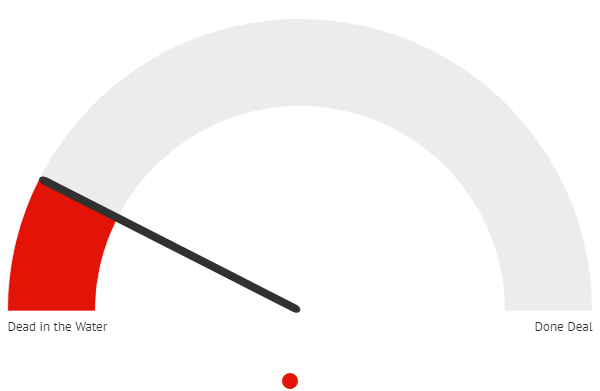
How close are we to a deal on infrastructure funding? This week's Infrastructure Meter pegs it at 15%, up slightly from last week's 10%. See the reason for the slight uptick in optimism in this week's Capitol Agenda.
Heading into this year, the self-proclaimed “Builder-in-Chief” said infrastructure funding priorities would be made part of his agenda. Last year, transportation leaders on Capitol Hill had dismissed Trump’s 10-year, $1.5 trillion plan. Its significant reliance on non-federal funds proved difficult for authorizers to support.
Transportation Secretary Elaine Chao, as expected, praised Trump.
“The president issued a bipartisan call to repair and restore America’s aging infrastructure,” said the secretary. “Over the last two years, due to the president’s policies, our economy has generated historic levels of economic and job growth for Americans and widespread private sector investment.”
Trump’s vague messaging on infrastructure legislation notwithstanding, the desire in Congress to advance a comprehensive package remains alive.
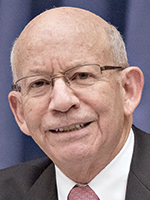
DeFazio
Senate transportation leaders recently expressed support for a fiscally responsible measure capable of advancing this year. In the House, Transportation panel Chairman Peter DeFazio (D-Ore.) insists he’ll have legislation ready in a few months.
Reacting to the president’s address, DeFazio said: “Any serious infrastructure proposal must provide sustainable, long-term federal funding so we can make these necessary investments, create millions of living-wage American jobs, increase economic growth, and decrease congestion and emissions.”
His Republican partner on the panel, Missouri Rep. Sam Graves, welcomed Trump’s remarks.
“With the president’s leadership on infrastructure, and the widespread agreement on the need to act, we have a prime opportunity to achieve something that matters to people across the country and to our economy,” Graves said. “It’s up to Congress to work together and with the administration to find common ground on issues that pose real threats to the future of our infrastructure network.”
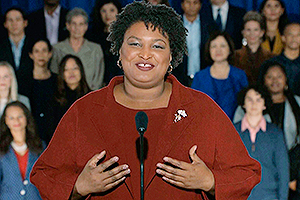
Abrams via Pool/AP
Also missing from the president’s address were references about climate science and the recent partial shutdown of federal agencies at the start of the 116th Congress. In the Democratic response to the State of the Union, former Georgia gubernatorial candidate Stacey Abrams omitted references about infrastructure while focusing on policy initiatives not raised by Trump, insisting the shutdown was avoidable.
“We can do so much more. Take action on climate change, defend individual liberties with fair-minded judges,” said Abrams.
In recent years, transportation stakeholders representing the freight and commuter sectors have urged lawmakers to pass bills meant to repair and maintain the network of roads, bridges, railroads and ports around the country.
Funding authority for highway projects expires in the fall of 2020, and revenue from federal fuel taxes is insufficient to sustain the Highway Trust Fund, the account used to assist states.
The American Society of Civil Engineers has repeatedly observed that the country’s infrastructure is in poor condition. Its most recent quadrennial report card, unveiled in 2017, issued an overall grade of “D+” to infrastructure. As the group’s president, Robin Kemper, noted after the State of the Union: “We have continued to underinvest for far too long, and an infrastructure bill is overdue.”

Spear
“America’s truckers, along with a broad coalition of the business community, have pledged our financial commitment to making this national priority a reality,” said American Trucking Associations President Chris Spear. “Decades of failed leadership in Washington have led us to this point, which is why we commend the president for seizing this opportunity to bring all sides together to forge a common path forward.”
American Road and Transportation Builders Association president Dave Bauer, whose group consistently calls for the adoption of a sustainable funding application for the Highway Trust Fund account, added, “The last two federal surface transportation investment laws were achieved during eras of divided government. This time should be no different.”



